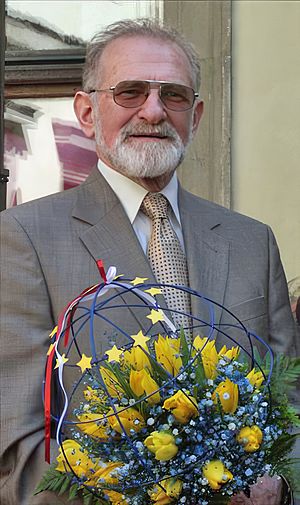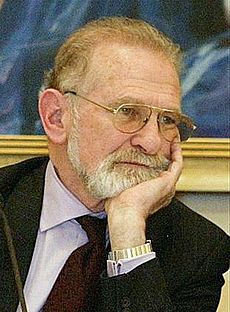Bronisław Geremek facts for kids
Quick facts for kids
Bronisław Geremek
|
|
|---|---|

Bronisław Geremek in May 2004.
|
|
| Minister of Foreign Affairs of Poland 5th Minister of Foreign Affairs of the Third Republic of Poland |
|
| In office 31 October 1997 – 30 June 2000 |
|
| President | Aleksander Kwaśniewski |
| Prime Minister | Jerzy Buzek |
| Preceded by | Dariusz Rosati |
| Succeeded by | Władysław Bartoszewski |
| Chairman of the Freedom Union | |
| In office 18 December 2000 – 14 October 2001 |
|
| Preceded by | Leszek Balcerowicz |
| Succeeded by | Władysław Frasyniuk |
| Personal details | |
| Born |
Benjamin Lewertow
6 March 1932 Warsaw, Poland |
| Died | 13 July 2008 (aged 76) Lubień, Poland |
| Political party | Freedom Union, Partia Demokratyczna – demokraci.pl. (Democratic Party) |
| Spouse | Hanna Geremek |
| Profession | Historian |
Bronisław Geremek was an important Polish historian and politician. He was born Benjamin Lewertow in Warsaw, Poland, on March 6, 1932. He passed away on July 13, 2008.
Geremek held many important positions in Poland's government. He was a Member of Parliament from 1991 to 2001. He also served as Poland's Minister of Foreign Affairs from 1997 to 2000. Later, he became a Member of the European Parliament from 2004 until his death.
Contents
Early Life and Learning
Bronisław Geremek was born in Warsaw. His father died during World War II. In 1943, Bronisław and his mother were helped to escape the Warsaw Ghetto. They were sheltered by Stefan Geremek, who later married Bronisław's mother. Bronisław grew up in a Catholic home.
He studied history at the University of Warsaw and graduated in 1954. He continued his studies in Paris, France, from 1956 to 1958. He earned his PhD in 1960. In 1972, he received a postdoctoral degree from the Polish Academy of Sciences. He became an associate professor in 1989.
Geremek mostly studied the history of culture and medieval society. He wrote many articles and ten books, which have been translated into different languages. His postdoctoral work was about groups in medieval Paris.
He worked at the Institute of History of the Polish Academy of Sciences for many years. He also taught at the Sorbonne in Paris. Many universities around the world gave him honorary degrees. He was a professor at the College of Europe until he passed away.
Political Journey
Joining the Opposition
In 1950, Geremek joined the Polish United Workers' Party. This was the ruling party in Poland at the time. However, he left the party in 1968. He did this to protest against the invasion of Czechoslovakia by Soviet-led forces.
During the 1970s, Geremek became a key figure in Poland's movement for democracy. In 1978, he helped start the Society for Educational Courses. He gave lectures for this group.
In August 1980, he joined the workers' protests in Gdańsk. He became an adviser to the independent trade union called Solidarność. In 1981, he led a program commission for Solidarity. When martial law was declared in December 1981, he was held by the authorities. He was released in December 1982. He then continued to advise the now-illegal Solidarity, working closely with Lech Wałęsa. He was arrested again in 1983.
Poland's New Beginning
The Round Table Talks
From 1987 to 1989, Geremek led a group that planned peaceful changes for Poland. In 1989, he played a very important role. He was part of the talks between Solidarity and the government. These talks led to free elections and the start of a new democratic parliament in Poland.
Building a New Republic
After these changes, Geremek helped create The Democratic Union party. This party later joined with another to form The Freedom Union. He led the Democratic Union's group in parliament from 1990 to 1997.
After the 1991 elections, President Lech Wałęsa asked Geremek to form a new government. However, he was not able to do so.
From 1989 to 2001, Geremek was a member of the Sejm, which is the lower house of the Polish parliament. He led the Sejm's Committee on Foreign Affairs for many years. He also chaired committees on the constitution and European law.
In October 1997, a new government was formed. Geremek became the Minister of Foreign Affairs. He served under Prime Minister Jerzy Buzek until 2000. In 1998, Poland led the OSCE. Bronisław Geremek was its chairperson. In March 1999, he signed the agreement for Poland to join NATO.
Serving in Europe
In June 2004, Geremek was elected to the European Parliament. He won the most votes in Warsaw. In the European Parliament, he was part of the Alliance of Liberals and Democrats for Europe. He strongly believed in the idea of a united Europe. He felt it was important for people to understand the benefits Europe could bring to them.
From 2006 to 2008, he was the president of the Jean Monnet Foundation for Europe. He also supported the idea of creating a United Nations Parliamentary Assembly.
Awards and Honours
Bronisław Geremek received many awards for his work:
- 2004: Order of the Three Stars
- 2002: Order of the White Eagle (Poland's highest award)
- Knight Grand Cross in the Order of Leopold II
- 2002: Knight Grand Cross of Order of the Cross of Terra Mariana
- 2000: Order of Merit of the Italian Republic
- Knight Commander's Cross of the Order of Merit of the Federal Republic of Germany
- 2002: Pour le Mérite
- Officer in the Legion of Honour
- 1999: Golden Plate Award of the American Academy of Achievement
- 1998: Karlspreis (Charlemagne Award)
- 1997: Commander's Cross of the Order of the Lithuanian Grand Duke Gediminas
- Grand prix de la francophonie of the Académie française
His Passing
Bronisław Geremek died on July 13, 2008. He was in a car accident near Lubień, Poland. He was given a state funeral in Warsaw. Many important people attended, including the President and Prime Minister of Poland.
Honoured After Death
In January 2009, the European Parliament named the main courtyard of its building in Strasbourg after Bronisław Geremek. This was to honour his contributions.
Books He Wrote
- Litość i szubienica: dzieje nędzy i miłosierdzia (1989)
- Świat "opery żebraczej": obraz włóczęgów i nędzarzy w literaturach europejskich XV-XVII wieku (1989)
- Rok 1989 – Bronisław Geremek opowiada, Jacek Żakowski pyta (1990)
- The Margins of Society in Late Medieval Paris (with others)
- Wspólne pasje (with Georges Duby; 1995)
- Szansa i zagrożenie. Polityka i dyplomacja w rodzinnej Europie (2004)
Translations He Made
- Fernand Braudel, Historia i trwanie (1971, 1999)
See Also
 In Spanish: Bronisław Geremek para niños
In Spanish: Bronisław Geremek para niños
 | Chris Smalls |
 | Fred Hampton |
 | Ralph Abernathy |


